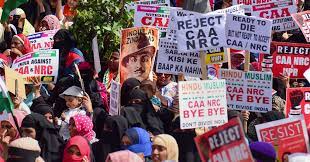During a political rally in Kolkata, Home Minister Amit Shah of the BJP stated that the Citizenship Amendment Act (CAA) is the law of this country, and we will implement it.

Dr. Niraj Krishna
Mahatma Gandhi said on July 7, 1947, “Hindus and Sikhs living in Pakistan, if they do not wish to stay there, can undoubtedly come to India… In this matter, it is the first duty of the Indian government to provide them with employment, citizenship, and a life of dignity.” On December 18, 2003, Dr. Manmohan Singh also stated, “Minorities are facing persecution in countries like Bangladesh… and if circumstances force these people, it is our moral duty to grant them citizenship; the government should consider this.”
After independence, the primary agendas of the first Jan Sangh and now the BJP have been threefold. Firstly, the removal of Article 370 from Jammu and Kashmir. Secondly, the construction of the Ram temple in Ayodhya, and thirdly, the implementation of a uniform civil code throughout the country. After completing work on the first two agendas, the BJP is now emphasizing the implementation of the Uniform Civil Code.
During a political rally in Kolkata, Home Minister Amit Shah of the BJP stated that the Citizenship Amendment Act (CAA) is the law of this country, and we will implement it. He mentioned that the Narendra Modi government will implement the Citizenship Amendment Act, and no one can stop it. He asserted that those who have come from there (referring to neighbouring countries) have as much right in this country as yours and mine, and no one can take away their rights.
It is being said that Home Minister Amit Shah has initiated the election campaign for the Bhartiya Janata Party (BJP) in West Bengal in preparation for the upcoming Lok Sabha elections. He stated that the infiltration in the state has not been stopped by the Mamata Banerjee government. Today, voter cards and Aadhar cards are being openly and illegally distributed to infiltrators, and the state government is silent on this matter. Mamata Banerjee is opposing the Citizenship Amendment Act (CAA). She does not let Mr. Modi develop Bengal. The Bengal that used to resonate with Ravindra Sangeet in the early mornings is now echoing with bomb blasts. While poverty is decreasing throughout the country, Bengal is not witnessing a reduction in poverty. Amit Shah mentioned that CAA is a law of the country, and no changes can be made to it. The government will uphold it by introducing the Uniform Civil Code by March 2024.
According to the Citizenship Law of 1955, illegal immigrants cannot acquire Indian citizenship. Under this law, those who enter India without valid travel documents such as passports and visas, or those who enter with valid documents but stay beyond the specified period, are considered illegal immigrants.
The Citizenship Amendment Act of 2019 has eased the rules for citizenship for Hindu, Sikh, Buddhist, Jain, Parsi, and Christian immigrants from Afghanistan, Bangladesh, and Pakistan. Earlier, it was mandatory for a person to have lived in India for at least the past 11 years to be eligible for Indian citizenship. By making this rule easier, the period for obtaining citizenship has been reduced from one to six years for people who have settled in India from the mentioned three countries and belonging to the six religions. In simpler terms, non-Muslim immigrants from the three neighbouring countries will now be eligible for citizenship after residing in India for at least six years.
According to the Citizenship Amendment Act, as of December 31, 2014, or earlier, individuals belonging to religious minorities from Bangladesh, Pakistan, and Afghanistan, namely Hindus, Paresis, Jains, Sikhs, Buddhists, and Christians, shall not be considered illegal immigrants in India. However, it is important to note that this provision does not include Muslims. The Citizenship Amendment Act of 1955 prohibits illegal immigrants from acquiring Indian citizenship.
The main opposition argues that the law specifically targets the Muslim community. Their argument is based on the violation of Articles 14 and 15 of the Constitution, which speak about the right to equality. While Article 15 addresses equality on the basis of religion, the potential discrimination based on religion for Indian citizens, as opposed to foreign citizens, is a concern. Article 14, which talks about equality before the law and equal protection of the laws, does not guarantee equality for all but rather equality among equals. In such cases, where one is the oppressed and the other the oppressor, the Constitution allows for positive discrimination, known as affirmative action. Articles 14, 15, 16, 19, 29, and 30 in the Constitution are applicable only to Indian citizens, not foreign citizens. Therefore, the law will apply to refugees coming from Pakistan or other countries only after they become Indian citizens. In the north-eastern region, there is a concern that if the Citizenship Amendment Act of 2019 is implemented, it will create an identity and livelihood crisis for the indigenous people.
Through this, the government is amending the Citizenship Act of 1955, making changes for religious minorities in the three countries – Bangladesh, Pakistan, and Afghanistan. Hindus, Sikhs, Buddhists, Jains, Paresis, and Christians residing in these countries will not be considered “illegal immigrants” even if they enter India without valid documents. They will not face deportation under the Passport Entry into India Act of 1920 and the Foreigners Act of 1946.
These people have been unsuccessful in providing evidence of their Indian origin, so they will have to take citizenship under naturalization. In this case, it will take 12 years, but the government is planning to amend this to 7 years because under the previous law, granting them citizenship is not possible, and they are facing genocide in their countries based on religious grounds.
Critics say that discrimination is happening on the basis of religion. This is a violation of Article 14. This amendment will affect the National Register of Citizens (NRC) in Assam because it does not discriminate on the basis of religion. Some people say that this will lead to an influx of Hindus from neighbouring countries, but this is not true. Only those who have come to India before 2014 will be granted citizenship.
This list includes Christians and Paresis as well; thus, secularism has come into play. Actually, this bill is an attempt to grant citizenship to religious minorities who are persecuted because it is not aimed at preventing anyone from obtaining citizenship on religious grounds; hence, Article 14 is not violated.
The Indian Constitution talks about equality among equal individuals. It does not talk about equality among unequal individuals. Here, all oppressed religions are included, and the oppressor is not included. In this way, the constitution is favourable because it is aimed at providing refuge to oppressed religious minorities based on the criteria of being a minority.
Since India is a country committed to human rights, it cannot remain silent when religious minorities in neighbouring countries are being persecuted, especially when it claims a permanent seat in the United Nations. Our culture has been providing refuge to the persecuted, as seen in the past with the Paresis and Jews, and even after independence, to Tibetans.
The Law Commission has started taking public opinions on the Uniform Civil Code. It is believed that the central government could take a big political risk by introducing it before the 2024 Lok Sabha elections. How much benefit it can get in the elections remains to be seen, but legal experts say that for serious issues like the Uniform Civil Code, a lengthy process of making laws will have to be passed. There is no time for that now. In this case, the possibility of a uniform citizenship law before the Lok Sabha elections is unlikely.


